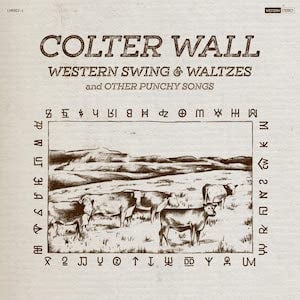
Colter Wall – Western Swing & Waltzes and Other Punchy Songs
Thirty Tigers -28 August 2020
For Western Swing & Waltzes, Colter Wall‘s third full-length album, the 24-year-old Canadian has immersed himself in America’s cowboy song tradition, rounding up a bunch of vintage numbers as well as his own campfire contributions, many, as you might imagine, involving horses, cows and guns.
Things break out of the corral with the self-penned title track, pedal steel in his saddlebags, Wall’s baritone sounding several decades older than his birth certificate states as, namechecking home state Saskatchewan, he sings of a bovine-raisin’ man, steer branding, rodeos and Western novelist Louis L’Amour. Heck, there’s even a Whoopi ti-yi-yo.
Collected and published in 1927, first popularised by Woody Guthrie and later recorded by Ian Tyson, featuring Jake Groves on harmonica and sung to a simple strummed guitar, I Ride An Old Paint/Leavin’ Cheyenne is a traditional cowboy song of unknown origin about an old cowboy asking for his bones to be tied to his horse when he dies and the pair sent off to the west.
It wouldn’t be a cowboy album without a gunfighter ballad and Wall turns to the master of the genre, the great Marty Robbins for Big Iron, the tale of a showdown between notorious outlaw Texas Red and an Arizona ranger with a big iron on his hip. And, being in an armament inclination, it’s followed by one of Wall’s own, the Cash-like mid-tempo paced Henry And Sam, the title being a reference to the 16-shot repeating rifle designed by Benjamin Tyler Henry and, of course, Samuel Colt.
One of Wall’s heroes is Ramblin’ Jack Elliot, a protégé of Guthrie and purveyor of cowboy songs, and he tips the hat (stetson I’d assume) here with a version of Diamond Joe, a less romanticised account of a cowboy’s life working for lying, cheating bosses, though the song isn’t actually one of Elliot’s but rather was written by Baldwin Hawes of the Almanac Singers to fit a character in one of Alan Lomax’s radio plays.
It’s back to the rodeo for cowboy poet Lewis Martin Pederson III’s twangy chugging High & Mighty, not about a cowboy this time but a bucking bronc in Calgary, the song concluding that “If he can’t buck you off you’ve learned to ride”. Another original follows, retaining a fumbled start, Talkin’ Prairie Blues, which, as you’d rightly assume, is a talking blues, the playful tale of “some dude” in a Tennessee barroom trying to introduce five hard-drinking cowboy travelling musicians to “some kind of beer” called IPA, the singer clearly not impressed with city life and looking to head back home “where the tallest buildings are all grain elevators”.
Stan Jones is famous for penning one of the signature cowboy songs, Ghost Riders in The Sky, but Wall has opted for one of his lesser-known numbers, Cowpoke, first recorded in 1951 by Elton Britt and the Skytoppers, which, with its strummed guitar, mandolin, forlorn pedal steel and coyote howl balance the romantic vision of the drifting cowboy with a reminder that there were hardships too – “Well I ain’t got a dime in these ol’ wore-out jeans/so I’ll stop eating steak and go back to beans”.
The round-up ends with two more originals, first up being Rocky Mountain Rangers, a scampering, fingerpicked, brushed snares homage to the volunteer Canadian mounted militia unit formed in response to the 1885 North-West Rebellion. And, having introduced the hoolihan, a backhand loop thrown with a lariat to catch horses, in the opening song, he ends with Houlihans at the Holiday Inn, the song a strum-along life on the road lament of a travelling cowboy singer wishing he was back home in the saddle (“haven’t put boot heel to belly/Since can’t remember when”) rather than entertaining the diners by “throwing houlihans at the Holiday Inn”.
It’s perhaps pitched at somewhat of a niche old school country market, but, to allude to another singing cowboy, if you have even the faintest affection for the genre you should saddle up and ride with him on these happy trails.
